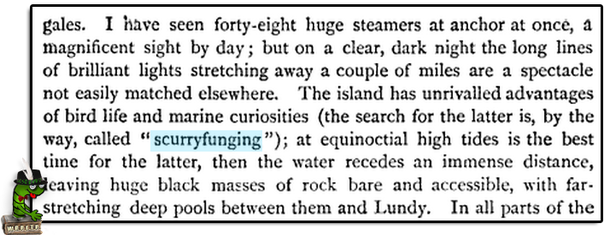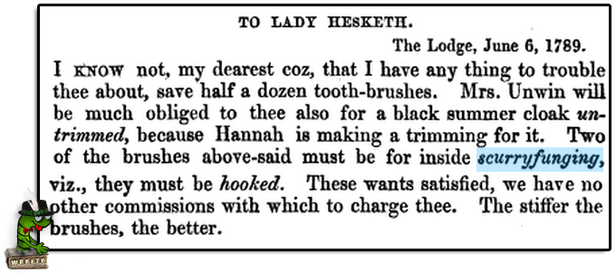Evidently both scurrifunge and scurrifungeing (in various spellings and pronunciations) are current words in Newfoundland English. Here are the entries for these two words from Dictionary of Newfoundland English: Second Edition with Supplement (University of Toronto Press: 1990):
scurrifunge v C[ompare] [Joseph Wright,] E[nglish] D[ialect] D[ictionary (1904)] ~ v 'to lash tightly, coire', fung v 3 'to do anything briskly...to work or walk hurriedly' Sc[otland]; Kilkenny Lexicon scurryfunge 'to scrounge, cadge or wheedle.' 1 To clean thoroughly, scour [Newfoundland example from 1970] — as to clean out a dirty sink [Newfoundland example from 1957] 2 To scold, reprove. To scurravunge someone [Newfoundland example from 1979].
scurrifungeing vbl n. See SCURRIFUNGE. C[ompare] [Joseph Wright,] E[nglish] D[ialect] D[ictionary (1904)] fung 1 'to strike beat kick' Sc[otland] for sense 2. 1 A thorough cleaning. The charwoman gave an instance of this word when she was about to clean a table—she gave it a good scurifunshin [Newfoundland example from 1965]. If a child comes into the house with a dirty face or dirty hands his mother will say to him 'You need a good scurrafungin'—a good washing or cleaning up. It may also be giving a good scrubbing or cleaning to anything that is dirty [Newfoundland example from 1971]. 2 A trouncing; decisive defeat in a game. We received a scurrafungin'. We were beaten in playing cards many times in succession [Newfoundland example from 1966]. In a fight, the man who received the most marks or took the most punches was said to get 'some scurrifungen' [Newfoundland example from 1971].
As those entries suggest, Joseph Wright, English Dialect Dictionary (1900, 1904) does indeed have the specified entries for scurrifunge and for fung.
The problem here isn't the phantom nature of the words, since they turn out to be very real indeed; it's the multiplicity of possible spellings, pronunciations, and meanings. The two Dictionary of Newfoundland English entries contain seven different spellings for scurryfunge/scurryfunging—and that list has numerous obvious gaps in it (such as scurryfunging itself) that would bring the total number of variants to 60: scurrafunge, scurrafungeing, scurrafungen, scurrafungin', scurrafunging; scurrifunge, scurrifungeing, scurrifungen, scurrifungin', scurrifunging; scurryfunge, scurryfungeing, scurryfungen, scurryfungin', scurryfunging; plus another 15 variants with a v replacing the f in the first 15 variants; plus another thirty variants with an sh replacing the g in the first 30 variants. Additional variants are undoubtedly possible.
Searching Google Books for some of the less common variants yields matches like this one from Isabella Steward, The Interdict (London, 1840):
Mrs Mulligan, though very much affronted, and bent on scurrafungeing Lanty and the cow, never relaxed in dinner preparation. The perfume of roast pig, black pudding, and drisheens ["Sheep's fry"] might have provoked the mandibles of Epictetus.


